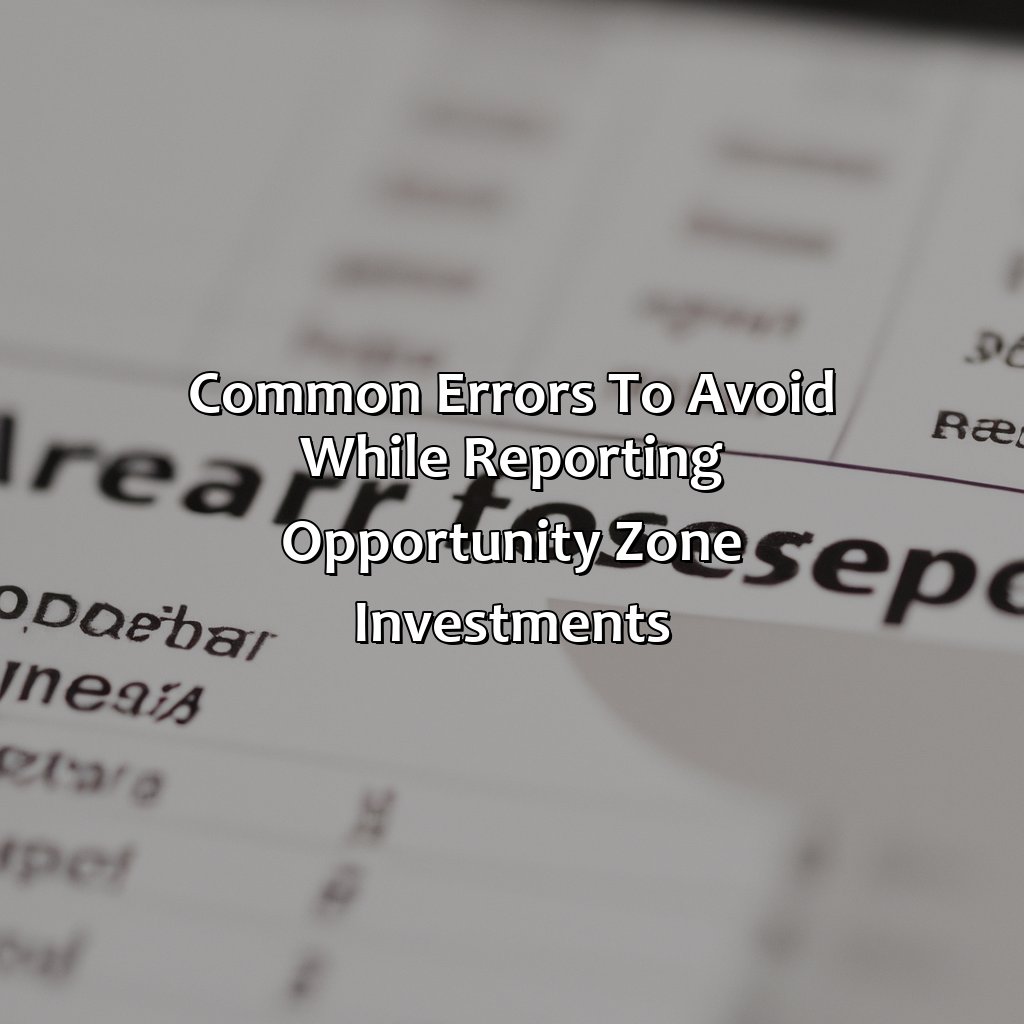How To Report Opportunity Zone Investment?
Key Takeaway:
- Opportunity zone investment reporting is crucial for maximizing tax benefits: Accurate reporting of opportunity zone investments is necessary to qualify for tax incentives and avoid penalties.
- Understand the requirements for reporting opportunity zone investments: To report opportunity zone investments, it is essential to understand the Form 8996 and the necessary criteria for qualifying for tax incentives.
- Follow the steps to report opportunity zone investments correctly: Gather all the information required for completing Form 8996, accurately fill out the form, and file it with the IRS within the deadline to avoid errors and penalties.
Do you want to learn how to benefit from the Opportunity Zone tax incentives? This guide provides you a step-by-step process to report your investments and maximize the tax benefits.
Requirements for reporting opportunity zone investments
For reporting opportunity zone investments, you must know Form 8996 and the qualifications for tax incentives. To help, this section will guide you. It’ll make understanding the process simpler.

Image credits: retiregenz.com by Adam Arnold
Understanding the Form 8996
To comply with the requirements for reporting opportunity zone investments, Form 8996 must be understood. The form demands eligible entities to self-certify as qualified opportunity funds and mandates annual reporting on such investments.
Form 8996 includes details on the fund’s inception, investments, and capital gains. In addition, it requires data on the Qualified Opportunity Zone (QOZ) businesses burdened by the fund’s investment, allowing for further economic analyses.
It is noteworthy that failing to file Form 8996 could compel investors to pay taxes earlier than expected and potentially jeopardize funding eligibility in subsequent applicable tax years.
To ensure full compliance, one should maintain proper records of QOF activities including gains/losses – a written narrative substantiating the use of qualified opportunity property in new or expanding QOZ businesses should also be recorded. Furthermore, there must be valid proof of timely filing; this can include delivery receipts from a recognized delivery service.
Get rewarded for investing in low-income areas, just don’t expect a medal from the IRS.
Qualifying for tax incentives
To be eligible for tax incentives, investments must fall under the requirements set forth in the opportunity zone program. These include investing in qualified opportunity funds that invest in designated low-income areas and meeting certain holding period requirements.
Additionally, investments must meet various other guidelines related to business activities and asset types. Proper record-keeping and reporting are essential to comply with regulations and take advantage of these tax benefits.
It is important to note that not all investments or investors may qualify for these tax incentives, and consulting with a financial professional is recommended.
Investors who do qualify for the tax benefits may see significant reductions in capital gains taxes and potential long-term appreciation on their investment returns.
Reporting opportunity zone investments may sound daunting, but with these simple steps, you’ll be able to handle it like a pro.
Steps to report opportunity zone investments
To report your opportunity zone investments correctly and punctually, take the following steps:
- Gather the information needed for Form 8996.
- Complete Form 8996 accurately.
- Then, submit the form to the IRS before the due date!

Image credits: retiregenz.com by Harry Washington
Gathering necessary information for Form 8996
To ensure accurate reporting of opportunity zone investments, it is crucial to gather all necessary information for Form 8996. This includes gathering data on the amount and type of investment made in each opportunity zone, as well as the date the investment was made. Additionally, it is important to gather information about the tangible property or business in which the investment was made.
In order to accurately report opportunity zone investments, investors must have a deep understanding of the Qualified Opportunity Fund (QOF) regulations. It is also recommended that investors work closely with qualified tax professionals who can provide guidance throughout the reporting process. Another useful strategy is to maintain detailed records of all investments and related transactions.
Overall, accurate reporting of opportunity zone investments requires careful attention to detail and proactive planning. By working closely with tax professionals and maintaining thorough records, investors can ensure compliance with complex tax regulations while maximizing their return on investment. Get your numbers right on Form 8996, or the IRS might have a bone to pick with your opportunity zone investment.
Completing Form 8996 accurately
To ensure compliant reporting of opportunity zone investments, accurate completion of Form 8996 is crucial. This form gathers information on qualified opportunity funds’ compliance with tax laws.
Here’s a 5-Step Guide to Completing Form 8996 accurately:
- Provide basic identifying information such as the fund name, EIN, and address.
- Disclose whether the fund is a partnership or corporation for tax purposes.
- Indicate whether you’re filing an initial return or amended return for the taxable year.
- Verify that your fund satisfies the requirements of qualifying as an Opportunity Zone Fund.
- Submit Form 8996 to the IRS electronically before the filing deadline.
It’s important to answer all relevant questions truthfully and completely for successful compliance reporting.
For additional assistance in completing this form or other related tax filings, consult professional accounting/financial advisory services.
True Story – A notable company was attempting to file their taxes for their qualified opportunity funds, but found it challenging due to regulatory thresholds and legal complexities related to Treasury applications/forms submission requirements. Amidst navigating through these regulations, expected timeframes for returns submission were affected significantly – leading them towards seeking expert help from seasoned professionals that ensured their proper filing – staying in-line with required standards across regulations & industry practices.
Nothing like a deadline to make you finally tackle that pile of paperwork – especially when it comes to reporting opportunity zone investments.
Filing the form with the IRS within the deadline
To satisfy the IRS, submitting the form within the deadline for opportunity zone investments is essential. The submission should be made on time to avoid any potential audit or penalty by the IRS.
Here’s how to file the form with the IRS before the deadline:
- Locate and download Form 8996 (Qualified Opportunity Fund) as it is required by the IRS.
- Fill in all relevant information, including your business’s name, address, and Employer Identification Number.
- Make sure you correctly provide details about where you invested and qualified opportunity funds’ amount in your business.
- You must also provide a statement explaining why your investment satisfies “qualified opportunity zone” status.
- If you have formed multiple Qualified Opportunity Funds, file additional Forms 8996 for each one.
- Submit Form 8996 to the Department of Treasury by mail or electronically using signed electronic files.
Your qualified opportunity investment’s Form 8997 must be submitted alongside Form 1040 for tax returns. For several taxpayers, their most natural means of filing these items will be via their tax professionals.
It is important to note that failure to disclose enough funds necessary for annual compliance could cause severe problems with both previous and future profits. This type of negligence may lead to cancellation of deferred gains eligibility and even require rebuilding taxes from earlier years.
There was a case when a taxpayer claimed they built an Opportunity Zone Fund but didn’t inform that they were entering contributions late in their first tax return submission; however, only filing after the term had expired raised some evasion concerns that generated huge issues down the line involving civil penalties and exorbitant fines.
Reporting opportunity zone investments can be tricky, but it’s a lot easier than explaining to your accountant how you lost your entire investment playing the stock market.
Common errors to avoid while reporting opportunity zone investments
When it comes to reporting Opportunity Zone investments, there are several common errors that investors and reporting entities must avoid. It is essential to keep these blunders in mind to avoid any legal and financial implications that may arise due to improper reporting.
To ensure accurate reporting of Opportunity Zone investments, here are three common errors to avoid:
- Failure to understand and follow the specific IRS guidelines
- Reporting incorrect or incomplete information
- Failure to report the investment within the required time frame
Apart from the common errors mentioned above, it is crucial to maintain clear and concise records of all Opportunity Zone investments to avoid any discrepancies in reporting. Proper documentation and record-keeping will help streamline the reporting process and avoid any confusion or misunderstandings regarding your investments.
Pro Tip: Seek guidance from experienced tax and investment professionals to ensure compliance with Opportunity Zone reporting requirements. Their expertise and knowledge will help mitigate the risk of errors in your reporting and help you maximize your returns.

Image credits: retiregenz.com by Adam Washington
Five Well-Known Facts About How To Report Opportunity Zone Investment:
Opportunity Zone investments offer tax benefits to incentivize investment in economically distressed areas. (Source: Investopedia)
Investors must invest through a Qualified Opportunity Fund (QOF) to receive tax benefits. (Source: IRS)
The QOF must invest 90% of its funds in Opportunity Zones. (Source: Forbes)
The tax benefits include deferral of capital gains taxes until 2026, reduction of capital gains taxes by up to 15%, and tax-free appreciation of Opportunity Zone investments. (Source: Tax Foundation)
Proper reporting of Opportunity Zone investments requires filing Form 8996 with the IRS and ensuring compliance with ongoing requirements. (Source: Novogradac)
FAQs about How To Report Opportunity Zone Investment?
What is an opportunity zone investment?
An opportunity zone investment is an investment made in a designated economically-distressed community called an Opportunity Zone, which provides tax incentives to investors.
How do I report an opportunity zone investment?
To report your opportunity zone investment, you need to file IRS Form 8996 and attach it to your federal income tax return.
What information do I need to include on Form 8996?
Form 8996 requires specific information about your opportunity zone investment, such as the name, address, and federal identification number of the qualified opportunity fund.
When is the deadline to report opportunity zone investments?
You should report your opportunity zone investment on Form 8996 with your federal income tax return by the applicable due date, including any extensions.
What are the penalties for not reporting an opportunity zone investment?
The IRS may assess penalties for failure to report your opportunity zone investment, including a penalty of $20 per day for each day the failure continues, up to a maximum of $10,000.
Can I amend my tax return to report an opportunity zone investment?
Yes, if you previously failed to report your opportunity zone investment, you can amend your tax return and include Form 8996 to report the investment and claim any applicable tax benefits.
 Checkout this IRS Loophole
Checkout this IRS Loophole 
